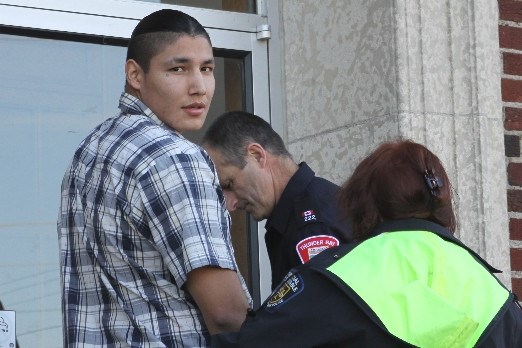Jessie George’s actions following the fatal beating of 19-year-old Kyle Kakeway had nothing to do with friendship, a superior court judge concluded before sentencing the Thunder Bay man.
Justice Helen Pierce read her sentence to a nearly empty Thunder Bay Superior Court of Justice courtroom Monday afternoon, and delivered a sentence of seven years in prison to the 22-year-old who pleaded guilty to manslaughter for the death of Kakeway.
The court heard how on April 15, 2009, George and Kakeway began to scrap by a laneway near the 500 block of Victoria Avenue.
The fight ended with Kakeway on the ground unconscious, a portion of George’s shoe print visible on his face from the repeated and brutal kicks he received.
George fled the scene.
Officers arrested George when he returned to the alley where the beating took place.
In court, George said his returning to the scene was an act of friendship.
Justice Pierce did not agree. The shoe prints on Kakeway's face betrayed George's claim.
"The ferocity of this attack on a young man he considered a friend was quite shocking," Justice Pierce said, adding the series of blows he delivered to Kakeway "can’t be characterized as friendship. A friend would call for help."
Kakeway died at the Thunder Bay Regional Health Sciences Centre on April 25, 2009.
Before announcing the seven-year prison sentence, Pierce described George’s chaotic upbringing.
George’s mother, a victim of the residential school system, became addicted to alcohol and continued to feed that addiction while she was pregnant with George.
His father deceased, George found himself in and out of foster care from the time he was eight years old. He was eventually sent to live on the streets when his stepfather left town suddenly, abandoning George.
The defense requested the judge give George a sentence that included three-to-five years of jail time, citing the defendant’s Fetal Alcohol Spectrum Disorder and troubled childhood as reasons for leniency
The Crown argued a sentence of six-to-10 years was more appropriate given the severity of the crime.
"Unfortunately it will do little for his Fetal Alcohol Syndrome Disorder," George’s defence attorney, David Bruzzese, told media following the sentencing.
"There was an article in the newspaper outlining how the justice ministers provincially were meeting with the federal justice minister and acknowledging that there has to be a third way to deal with (FASD), which requires intensive psychiatric treatment.
"Unfortunately I don’t think that is available in the prison system at this time."
George has requested to take part in the Aboriginal healing program as part of his rehabilitation. He will serve his sentence at Stony Mountain Institution.
Having already served more than 500 days in jail prior to pleading guilty, the court gave George 1,134 days credit toward his sentence. He will have to serve another four years before his sentence concludes.
